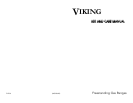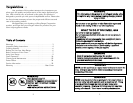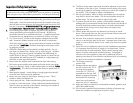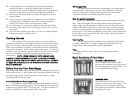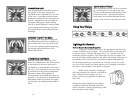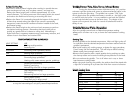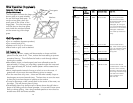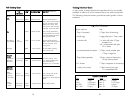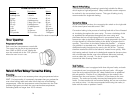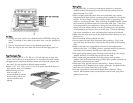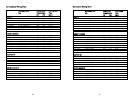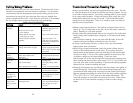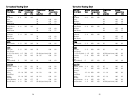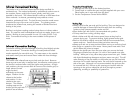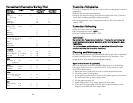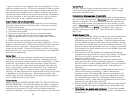
17
NNaattuurraall AAiirrffllooww BBaakkiinngg
This conventional baking/roasting is particularly suitable for dishes
which require a high temperature. Many cookbooks contain recipes to
be cooked in the conventional manner. This type of baking is only
recommended for single-rack baking.
CCoonnvveeccttiioonn BBaakkiinngg
For all convection functions, the convection fan switch on the right side
of the control panel must be turned “ON”.
Convection baking is the process of cooking food with a flow of heated
air circulating throughout the oven cavity. The even circulating of this
air equalizes the temperature throughout the oven cavity and
eliminates the hot and cold spots found in conventional ovens. This
feature can make a significant difference in foods prepared in the oven.
A major benefit of convection baking is the ability to prepare food in
quantity. The uniform air circulation makes this possible . . . a feature
not possible in a standard oven. With this heating system, the air is
distributed evenly throughout the oven by the hot air fan. The heat
therefore reaches the food to be baked or roasted more quickly. With
this heating method, foods can be baked and roasted at the same time
with minimal taste transfer, even when different dishes are involved,
such as cakes, fish, or meat. The hot air system is especially
economical when thawing frozen food.
RRaacckk PPoossiittiioonnss
Each convection oven is equipped with three tilt-proof racks, and each
convectional oven is equipped with two-tilt proof racks. All ranges
have five rack positions and the 24” deep models have an additional
6th rack position. Position 5 or 6 (depending on the model) is the
farthest from the oven bottom. Position 1 is the closest to the oven
bottom. The racks can be easily removed and arranged at various
levels. For best results with conventional baking, do not use more than
one rack at a time. It is also recommended when using two racks, to
bake with the racks on position 4 and 2.
16
KKiittcchheenn EEqquuiivvaalleennttss aanndd MMeettrriiccss
Measur
e Equivalent Metric*
1 tablespoon 3 teaspoons 15 mL
2 tablespoons 1 ounce 30 mL
1 jigger 1 1/2 ounces 45 mL
1/4 cup 4 tablespoons 60 mL
1/3 cup 5 tbsp. plus 1 tsp. 80 mL
1/2 cup 8 tablespoons 125 mL
1 cup 16 tablespoons 250 mL
1 pint 2 cups 30 grams
1 pound 16 ounces 454 grams
2.21 pounds 35.3 ounces 1 kilogram
*Rounded for easier measuring
OOvveenn OOppeerraattiioonn
TTeemmppeerraattuurree CCoonnttrroollss
Each oven has a temperature control dial.
The control can be set at any temperature
from 150
0
F to 550
0
F, or broil Always be
sure the controls are in the “Off” position
when the oven is not in use.
NNaattuurraall AAiirrffllooww BBaakkiinngg// CCoonnvveeccttiioonn BBaakkiinngg
PPrreehheeaattiinngg
Preheating the oven is not necessary when using temperatures below
250
0
F. For best results, it is extremely important that you preheat the
oven when baking cakes and other items that have critical baking
temperatures. After the temperature control has been set, the Oven
Indicator light goes out when the oven reaches that temperature.
Preheating takes no longer than 10-15 minutes.



